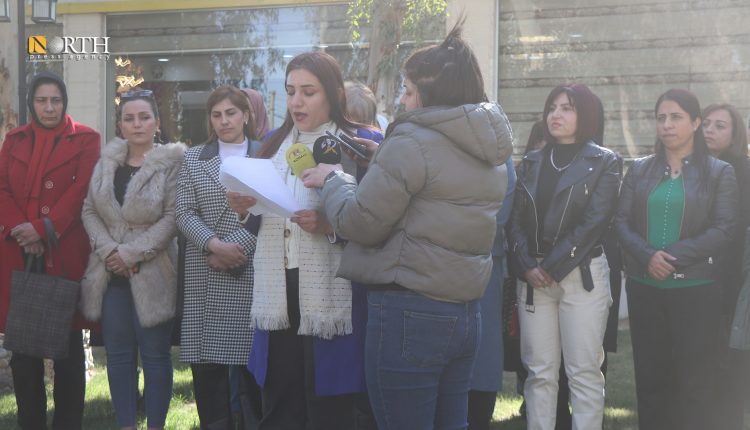Lawyers condemn inclusion of politician’s killer in Syrian administration
HASAKAH, Syria (North Press) – Female lawyers in the city of Hasakah, northeastern Syria, condemned on Saturday the inclusion of Turkish-backed armed factions, aka the Syrian National Army (SNA), and a leader implicated in the assassination of Kurdish politician Hevrin Khalaf in the newly formed Syrian administration.
During a press conference, rights activists from northeastern Syria denounced these factions as “war criminals.”
That same day, hundreds of women took to the streets of Qamishli in northeastern Syria, protesting against the participation of Turkish-backed SNA factions and the involvement of a leader accused of Khalaf’s murder in the new administration.
Hanan Rashku, a rights activist from Qamishli, rejected the inclusion of individuals whose “hands are stained with Syrian blood.”
She told North Press, “Legally, this is unacceptable. Anyone assuming a role in the country’s administration must be unconvicted and have clean hands.”
Hatem Abu Shaqra, whose real name is Ahmad al-Haiss is accused of orchestrating the murder of Hevrin Khalaf, Secretary-General of the Future Syria Party, along with her driver and an aide, on Oct. 12, 2019. The attack took place on the M4 international highway amid Turkey’s invasion of Sere Kaniye (Ras al-Ain) in northern Hasakah and Tel Abyad in northern Raqqa.
Al-Haiss was present at the speech of Ahmed al-Sharaa, who assumed the presidency of Syria in the transitional phase. He was accompanied by Mohammed al-Jasim (Abu Amsha), leader of the Sultan Suleiman Shah faction, also known as al-Amshat, and Saif Polat (aka Abu Bakr), leaders of the Hamza Division known as “al-Hamzat,” both sanctioned by the U.S. for human rights violations in Afrin.
Lawyer Khanem Ayo emphasized that in regions affected by conflict and human rights abuses, the rule of law must be upheld as the foundation of state-building. “Justice can only be achieved by holding perpetrators accountable,” she stated.
She further criticized the recent appointments in Damascus, describing them as unilateral and centralized decisions that lack the legal legitimacy necessary for broad recognition among Syria’s diverse communities.

